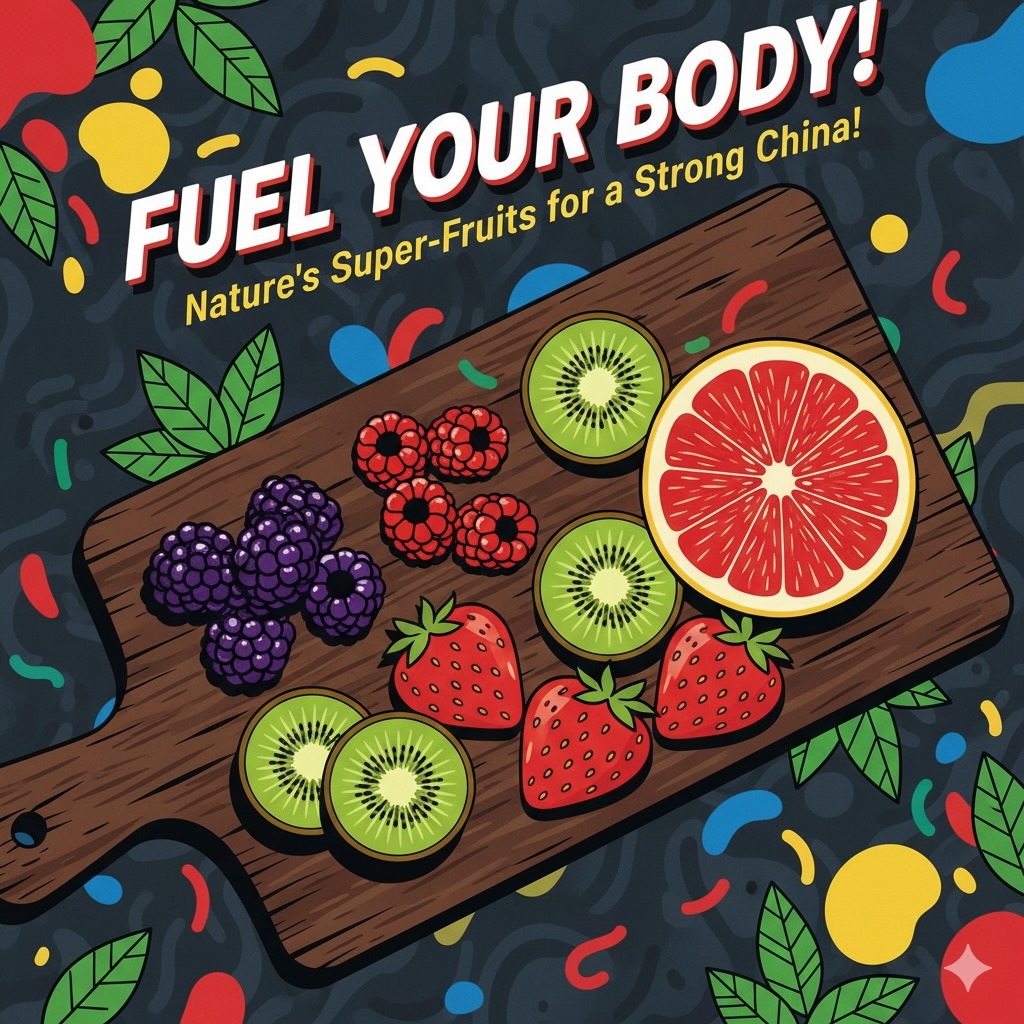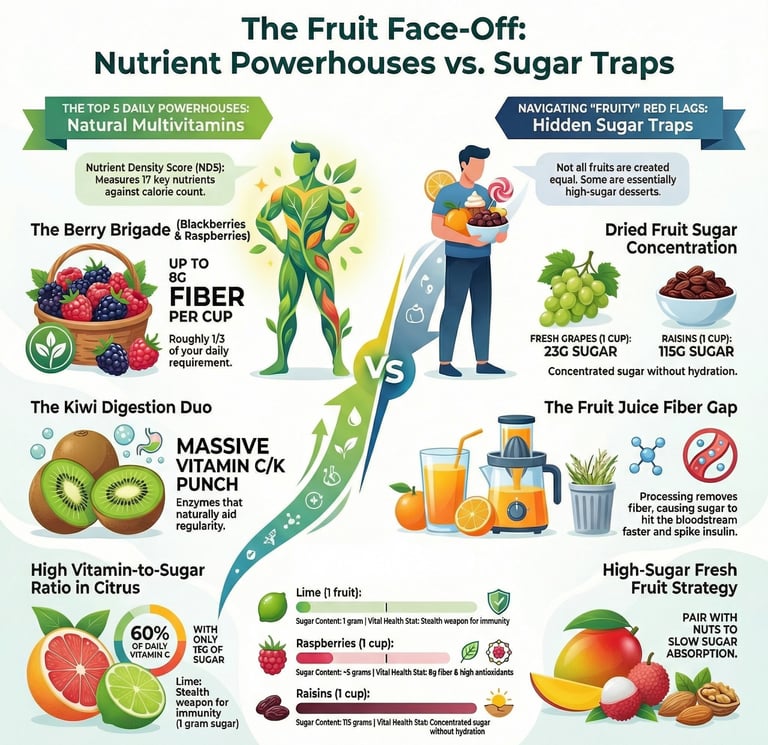Check requirements for Asia's Retirement Visas
The Fruit Face-Off: What are the 5 Most Nutrient-Dense Fruits to Eat Daily?
Discover the true nutritional champions of the fruit world. We break down the top 5 most nutrient-dense fruits—including berries, kiwi, and citrus—based on scientific data, and show you exactly why they should be in your daily diet.
HEALTHY RECIPES
10/24/20254 min read


The Great Fruit Divide: Why Some Fruits are Like a Nutritional Multivitamin (and Others are Just Dessert)
Let’s be honest: when we think of "healthy eating," a big bowl of fruit is usually step one. It’s sweet, it’s colourful, and it’s miles better than a candy bar, right? Absolutely. But if you think all fruits deliver the same powerhouse punch, I’m here to tell you to grab a seat, because not all fruits are created equal.
I once had a friend who ate two huge cups of dried pineapple every afternoon, thinking it was a healthy snack. I had to gently break the news: while dried pineapple started as a fruit, all that concentrated sugar meant she was basically mainlining a highly concentrated source of sweetness with less of the hydrating volume and original nutrient oomph.
The secret to maximizing your health benefits isn't just eating more fruit, it's eating nutrient-dense fruit. This means picking the ones that pack the highest volume of vitamins, minerals, and antioxidants for the fewest calories. Think of it as getting the best bang for your buck at the health store!
Ready to swap the sweet-but-simple snacks for a nutritional superpower? Let’s dive into the ultimate A-Team of daily fruits. Understand why a pure fruit and vegetable diet may not be the best at the end of the day.
Understanding the MVP Score: What is "Nutrient Density"?
To determine the true champions, we look beyond the calorie count to something called the Nutrient Density Score (NDS). A landmark 2014 study by the CDC looked at a wide range of "Powerhouse Fruits and Vegetables," ranking them on their concentration of 17 key nutrients (like fiber, potassium, and Vitamins A, C, and K) relative to their energy (calorie) content.
The results often surprise people! Many common fruits we assume are the healthiest barely cracked the list. But these five? They are the undisputed daily champions:
#1 Blackberries
Highest fiber and antioxidant concentration per calorie among the berries listed.Fiber, Vitamin C, Vitamin K, Manganese
#2 Raspberries
A fiber powerhouse, almost matching Blackberries, with high antioxidant levels.Fiber (Up to 8g/cup), Vitamin C, Manganese
#3 Strawberries
Excellent source of Vitamin C and a solid performer across multiple vitamins and minerals.Vitamin C, Folate, Manganese, Potassium
#4 Kiwi
Outperforms almost all fruits in Vitamin C, K, and E per calorie. Surprisingly high in fiber.Vitamin C, Vitamin K, Potassium, Folate
#5 Citrus Fruits (Lemon/Lime/Grapefruit)Incredible Vitamin C-to-Sugar ratio. Often have a very low sugar content relative to micronutrients.Vitamin C, Folate, Lycopene (in red grapefruit)
Source: Adapted from the CDC's "Powerhouse Fruits and Vegetables" ranking and common nutritional data (USDA).
A Closer Look at the Top 5 Powerhouses
1. The Berry Brigade (Blackberries, Raspberries, & Strawberries)
The true nutritional superstars are often small! Berries are nature's gift because they deliver a huge dose of fiber and antioxidants with a remarkably low glycemic load.
The Fiber Factor: Raspberries and Blackberries clock in at around 7-8 grams of fiber per cup, which is about a third of your daily recommended intake. Fiber is your gut’s best friend, helping slow sugar absorption and keeping you full for hours.
The Antioxidant King: Blueberries are famous, but Blackberries and Strawberries are right there with them, packed with anthocyanins. A 2024 review found that high berry intake is consistently linked to better heart health and reduced cognitive decline.
2. The Fuzzy Green Marvel: Kiwi
When was the last time you grabbed a kiwi? If you think of it as just a garnish, you're missing out. Gram for gram, the kiwi delivers a phenomenal one-two punch of Vitamin C and Vitamin K, which is essential for blood clotting and bone health.
My Anecdote: I always suggest a kiwi to friends who struggle with regularity. Its combination of fiber and actinidin (an enzyme) can be a gentle, natural way to keep things moving. Two kiwis before bed can often make a noticeable difference!
3. The Zesty Cleanse Crew: Lemons, Limes, and Grapefruit
These citrus fruits often get overlooked because we don't sit down and eat a whole one like an apple. But for nutrient density, they are perfection.
The Magic Ratio: They have an incredibly low sugar content compared to their vitamin load. Half a grapefruit (about 154g) contains less than 13 grams of sugar but gives you nearly 60% of your daily Vitamin C. A single lime, with just 1 gram of sugar, is a stealth weapon for immunity.
A Key Warning (Data Alert): Grapefruit can interact with certain medications, including some statins and blood pressure drugs, by altering how your liver metabolizes them. Always consult your doctor or pharmacist if you take regular medication before adding grapefruit to your daily diet.
Navigating the "Fruity" Red Flags
This isn't to say other fruits are "bad." A banana is a fantastic pre-workout snack, and a mango is a delicious source of Vitamin A. The issue is when we rely on the fruits that have a lower nutrient-to-sugar ratio.
The Fruits to Eat in Moderation
Dried Fruits (Dates, Raisins, Dried Mango)
Water removed, concentrating sugar. 1 cup of fresh grapes has about 23 grams of sugar; 1 cup of raisins has over 115 grams.A small handful, mixed with nuts for fiber and protein.
Fruit Juices (Even 100% Pure)
Most fiber is removed in processing. This allows the sugar to hit your bloodstream faster, leading to a blood sugar spike.Water, or an actual glass of blended fruit smoothie (with the pulp).
Lychee & Mango
Delicious, but high in natural sugars. One cup of raw lychee contains nearly 30 grams of sugar. Pair with a source of fat (like a few almonds) to slow sugar absorption. Yes, fruit sugar is fructose which eventually will convert to sugar in the body.
Your Simple Daily Fruit Strategy
Your goal shouldn't be perfection, but consistency.
Start Strong: Throw a handful of frozen Blackberries or Raspberries into your morning yogurt or oats.
Snack Smart: Keep Strawberries or pre-sliced Kiwi accessible for easy snacking.
The Hydration Hack: Add slices of Lemon or Lime to your water bottle. It adds flavor, vitamins, and zero sugar.
By consciously choosing the most nutrient-dense options, you’re not just eating fruit—you’re investing in every cell in your body. It's an easy win!
Check out the King of Fruits in Asia - The Durian!
Disclaimer This article is for informational purposes only and does not constitute medical advice. Always consult with a qualified healthcare professional, such as a doctor or registered dietitian, before making significant changes to your diet, especially if you have pre-existing health conditions like diabetes, or if you are taking prescription medications that may interact with certain foods (like grapefruit).



Address
Blk 8 Cantonment Close
SIngapore